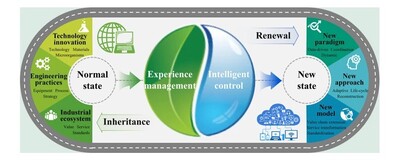AI use in the future of water treatment systems: study

Water scarcity is accelerating globally, driven by surging demand, pollution and climate volatility. A new study on water treatment system management, published in Frontiers of Environmental Science & Engineering by a team from Nanjing University, proposes a new blueprint for the water sector in the age of AI.
The study, led by Lili Jin, Hui Huang and Hongqiang Ren, introduces a tri-axis roadmap for incorporating AI across technological, engineering and industrial levels. By drawing from real-world case studies and emerging technologies, the authors have provided a framework for AI-driven water treatment, aiming to deliver sustainability, efficiency and resilience at scale.
The study outlines a complete transformation: from isolated technological fixes to a fully integrated smart water ecosystem. The addition of AI accelerates the design of advanced membranes, programmable nanomaterials and microbial communities tailored for pollutant degradation. These innovations are designed to improve efficiency, reduce costs and boost adaptability.
In terms of engineering practices, AI provides real-time control via digital twins, reinforcement learning algorithms and predictive analytics. For example, smart aeration systems guided by AI can slash energy use by over 30% while maintaining water quality standards. Beyond operational gains, the research illustrated how AI enables lifecycle-wide coordination — from raw water allocation to effluent reuse and emergency response.
The research suggested AI extends the value chain from infrastructure to data services. ‘Water Treatment as a Service’ models are emerging, where utilities pay based on performance metrics like pollutant removal or water reuse volumes. The result is a system that doesn’t just treat water, but continuously learns, adapts and improves — providing intelligent, service-driven water management.
“AI is more than a tool — it’s a strategic partner in reimagining the entire water treatment ecosystem,” said Huang, corresponding author of the paper. “By embedding AI into every stage — from material selection to process optimisation — we can transform reactive systems into predictive, self-adapting infrastructures. This not only improves operational efficiency, but aligns the sector with broader goals like carbon neutrality, ecological balance and sustainable development.”
The study envisions a near future where AI-powered water treatment systems become the norm rather than the exception. The systems can coordinate operations, reduce environmental footprints and enable long-term reliability — even under extreme climate conditions.
Applications range from real-time optimisation in urban water networks to precision treatment in industrial zones and zero-discharge parks.
With ongoing advances in sensors, cloud platforms and machine learning models, the blueprint provided by this study could soon evolve into a plug-and-play model for smart water infrastructure — creating greener cities and a more resilient water future.
Floating desalination solution to combat water scarcity
Veolia and SBM Offshore plan to develop and deploy freshwater floating production units to...
Calls for efficiency standards for data centre water use
A peak water body has released a report outlining key approaches that will deliver efficient and...
Mobile water services fleet expands in Oceania
Veolia is expanding its mobile water services fleet in Oceania as part of the company’s...









